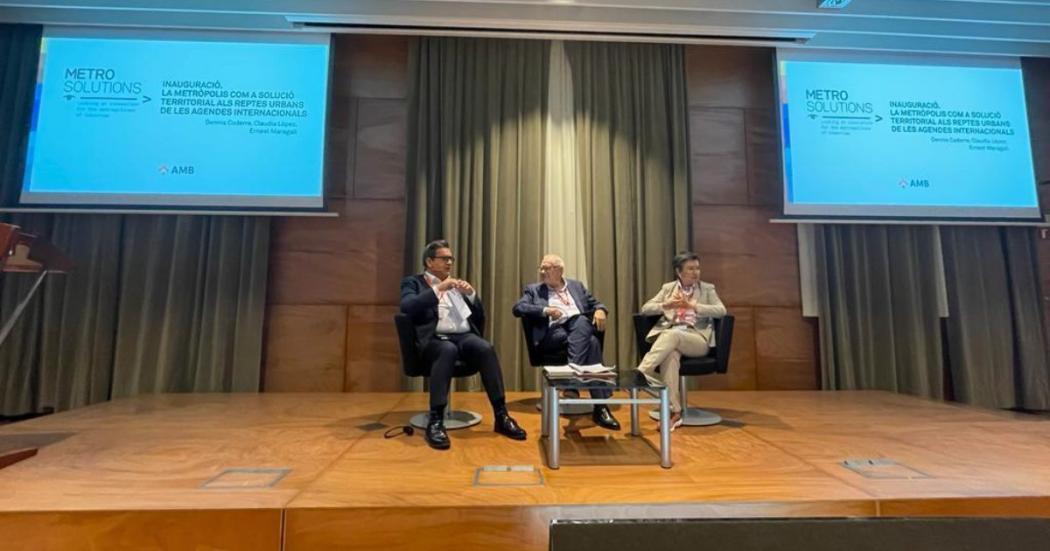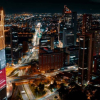During her visit to Barcelona, Spain, the Mayor of Bogotá, Claudia López, participated in a series of meetings focused on knowledge exchange in matters of governance, transparency, security, and social policy, mainly as a panelist at the Metro Solutions Congress, organized by the Metropolitan Area of Barcelona (AMB, as per the acronym in Spanish).
On the first day of the agenda in Barcelona, the Mayor met with a team of AMB representatives to exchange knowledge regarding the comprehensive management of cities immersed in metropolitan areas. Among the guests of the AMB were the directors of the Public Space Services areas, the International and Cooperation Area, the Ecology Area; and the Mobility, Transport, and Sustainability Area.
The following day, the Congress was officially opened using a work table methodology to promote the identification of common challenges and innovative solutions that can be shared and replicated to improve citizens’ living conditions.
Contenidos relacionados
There, the Mayor presented Bogotá’s experience at the regional level through strategies such as local government councils and the work of Open Government Bogotá in terms of transparency, with the aim of ensuring social equity based on urban policy.
“What needs to be deepened in any governance is the ability to redistribute opportunities and wealth through land use planning [...] People believe that democracy is useless because they do not feel that their daily problems are solved. Legitimacy and security come from efficiency and from solving people's problems through cooperation”, emphasized the Mayor.
Renowned international personalities participated in this event, such as the head of the Politics, Legislation, and Governance Section of the UN-Habitat Urban Practices Branch, Remy Sietchiping; and the head of the Krakow Metropolitan Area, Daniel Wrzoszczyk, who presented their experiences and possible solutions to replicate in the Latin American region.
Below is a tweet from the Barcelona Metropolitan Area (AMB) at the Metro Solutions Congress related to the Mayor's participation:
🌎 Congreso #MetroSolutions
— Cooperacio_InterAMB (@Coopr_InterAMB) October 17, 2022
👉@ClaudiaLopez y #DanielWrzoszczyk consideran prioritario trabaja desde la cooperación entre municipios a nivel metropolitano
👉 @ClaudiaLopez posiciona la importancia de trabajar a escala de proximidad, de los cuidados. pic.twitter.com/RyxGz7DjRa
The Governor of Cundinamarca, Nicolás García also participated in the event’s working groups, sharing his experiences and perspectives on the need to advance cooperation efforts with Bogotá.
"Governance and will are almost synonymous in these scenarios, our main advances have been in security with the cooperation of the metropolitan police, mobility with the next Regiotram, and food supply in the region," explained the Governor.
At the end of the day, Mayor López met with her counterpart from Barcelona, Mayor Ada Colau, to review progress on the cooperation issues agreed upon through the Memorandum of Understanding signed last November 2021 for the development of projects in matters of social and cultural rights, public management, social economy, and urban planning.
On her last day in Barcelona, the Mayor met with the Barcelona security and prevention manager, María Teresa Casado Cadarso, to learn about the infrastructure, operation, and successful strategies for citizen security and coexistence, with an emphasis on issues of micro-trafficking, migration management, and the fight against organized crime
Subsequently, she participated in a round table on informality management solutions in metropolises where she shared Bogotá’s challenges and solutions to informality. This was a session in which Mayor López had the opportunity to exchange experiences with local authorities from different Spanish cities.
Here, a tweet from the AMB about the event on solutions to informality in metropolises:
🌎 Congrés #MetroSolutions
— Cooperacio_InterAMB (@Coopr_InterAMB) October 18, 2022
Taula: Informalitat a les metròpolis @Elisendalamany
👉Cal repensar el concepte d’informalitat
👉 La informalitat és un fenomen global que pren formes diverses
👉 1 de 10 persones viuen assentaments infor.
60% població activa economia infor. pic.twitter.com/GFvPOElbpQ
Mayor López explained that there are three types of informality in Bogotá. Labor where informality reaches 35%, a figure that although lower than the general 52% seen in Colombia, is still high. Secondly, she spoke of the informality of urban constructions that amounts to 40% of local land, a phenomenon that is being reduced every day. And thirdly, the Mayhor spoke about the problem, which, as a consequence of the previous two, has to do with the overload of unpaid work that women do.
“As the Mayor of Bogotá, I am concerned about the overload of unpaid work done by women. In Latin America, we see it as normal to respond to the question: what does your mother do? by responding: nothing, she’s at home. But these women have no life, they don't stop, they don’t have a Sunday off, they have sacrificed their education, they live in poverty, but we see this as an act of love”, insisted Bogotá’s leader.
The Mayor's agenda in Barcelona concluded with a round table with directors of the Barcelona Metropolitan Strategic Plan, in her capacity as president of the Ibero-American Center for Strategic Urban Development (CIDEU, as per the acronym in Spanish). In this space, the metropolitan challenges of both Bogotá and Barcelona and how to address them from strategic urban planning projects were discussed.




